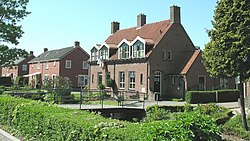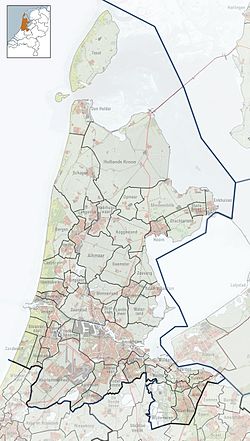Hem | |
|---|---|
Village | |
 | |
| Coordinates: 52°39′40″N5°10′59″E / 52.66111°N 5.18306°E | |
| Country | Netherlands |
| Province | North Holland |
| Municipality | Drechterland |
| Area | |
• Total | 8.44 km2 (3.26 sq mi) |
| Elevation | −0.5 m (−1.6 ft) |
| Population (2021) [1] | |
• Total | 1,550 |
| • Density | 180/km2 (480/sq mi) |
| Time zone | UTC+1 (CET) |
| • Summer (DST) | UTC+2 (CEST) |
| Postal code | 1607 [1] |
| Dialing code | 0228 |
Hem (West Frisian: Him) (population estimate: 1230) is a village in the municipality Drechterland, located in the north west of the Netherlands, in the province of North Holland and the region of West-Frisia.
Contents
The village was first mentioned around 1312 as Hem, and means "silted land in a bend of a stream". [3] Hem developed in the 12th century as a peat excavation settlement. [4]
The tower of the Dutch Reformed church dates from around 1500. The baluster and spire were constructed after a 1897 fire. [4] The matching church was demolished in 1972 after a fire. [5] The Catholic St Lucas Church is an aisleless church from 1930. [4] Hem was home to 591 people in 1840. [5]





